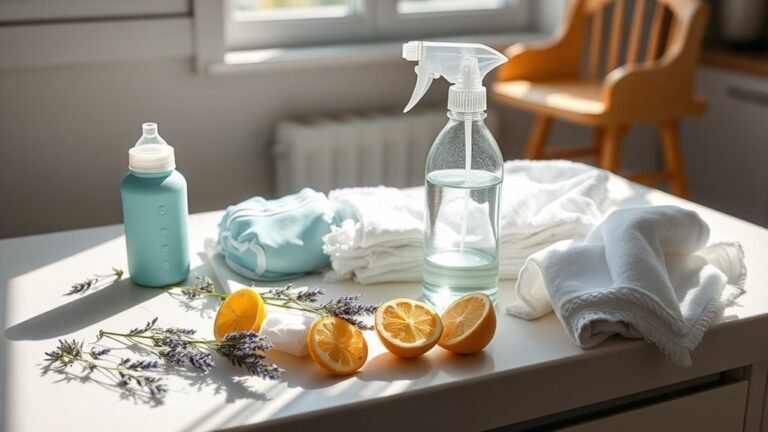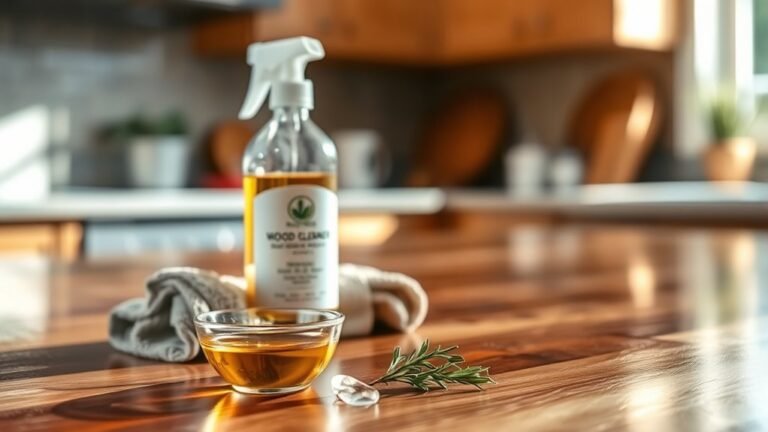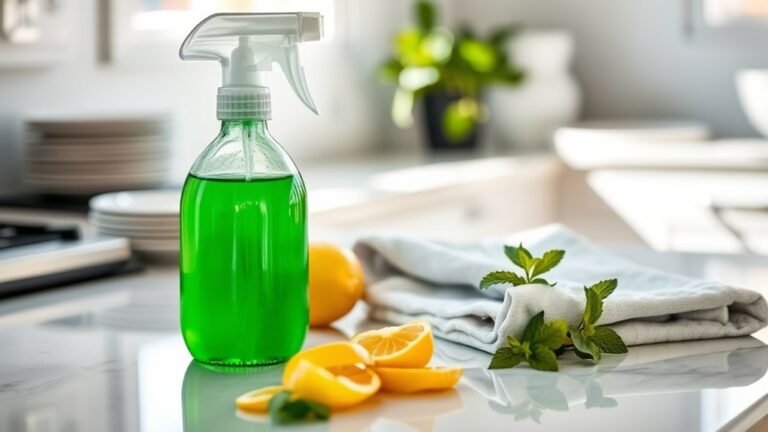Washing Window Without Damage
You can wash your windows without causing damage by using gentle, natural cleaning solutions like diluted vinegar or mild soap, avoiding harsh chemicals that erode glass or seals. Choose clean, lint-free microfiber cloths and rubber-bladed squeegees sized for your windows. Always prepare by removing loose dirt and washing in mild weather to prevent streaks and rapid drying. Taking careful steps guarantees your windows stay clear and intact. Explore further methods to protect your frames and maintain spotless panes.
Choosing the Right Cleaning Solutions
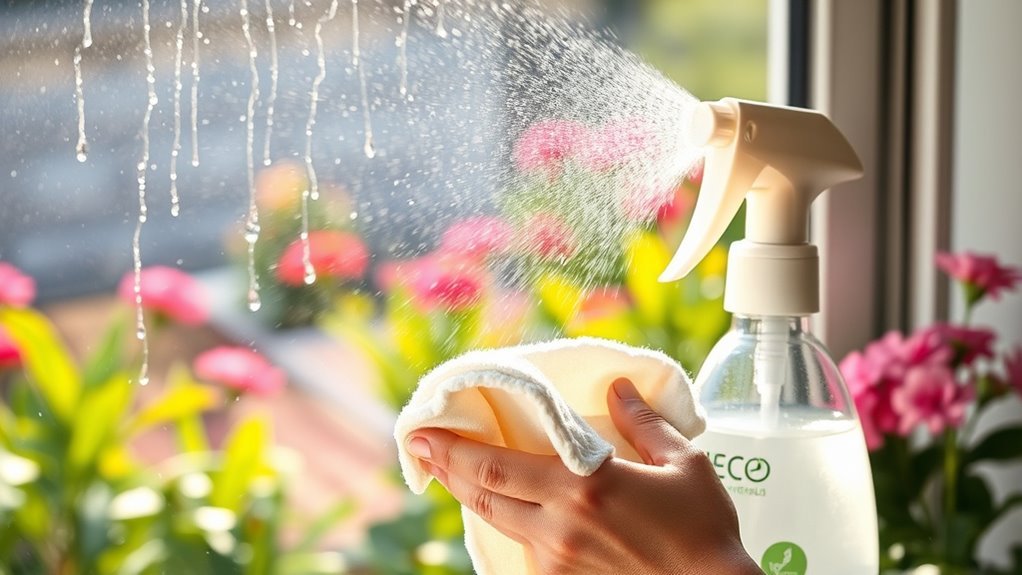
Although it might seem tempting to grab any household cleaner, choosing the right cleaning solution is essential to avoid damaging your windows. You’ll want to balance effectiveness with safety, steering clear of harsh chemicals that can erode glass or strip sealants. Natural alternatives, such as diluted vinegar or a mild soap solution, offer a gentle yet efficient means to clean without risking damage. These options provide freedom from toxic residues and are environmentally friendly. On the other hand, commercial products designed specifically for window cleaning often contain ingredients optimized for streak-free results but may include harsher agents. Always check labels carefully, opting for those labeled safe for glass and seals. By selecting the right solution, you maintain your windows’ integrity while enjoying a clear, bright view.
Selecting Appropriate Tools for Window Cleaning
When you set out to clean your windows, having the right tools on hand can make all the difference in achieving a spotless finish without causing damage. Choosing proper equipment guarantees efficiency and protects your glass surfaces. Focus on these essentials:
Having the right tools ensures spotless, damage-free window cleaning every time.
- Various squeegee types: Opt for rubber blades suited to your window size to prevent scratches.
- Microfiber cloths: Use lint-free, soft cloths to gently wipe edges and corners without leaving streaks.
- Adjustable extension poles: These give you freedom to reach high windows safely and comfortably.
Preparing Your Windows for Washing
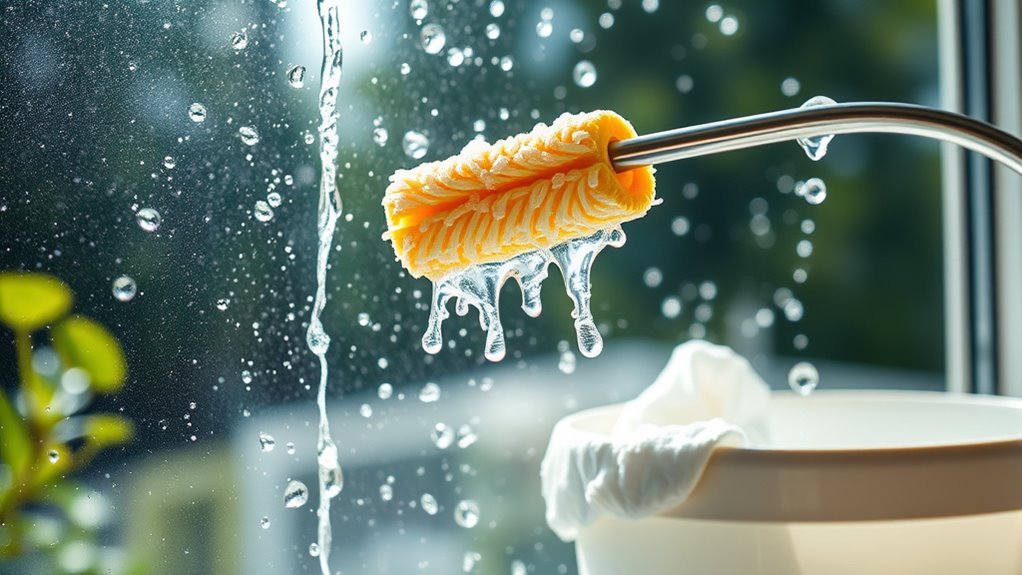
Before you start washing, there are three critical steps to prepare your windows properly: removing dust and debris, checking for damage, and choosing the right cleaning solution. Begin with a thorough window inspection, looking for cracks or loose seals that could worsen when wet. Clear away loose dirt using a soft brush or dry cloth to prevent scratching during cleaning. Weather considerations are essential; avoid washing windows under direct sunlight or in freezing temperatures to prevent streaks and damage. Opt for a cleaning solution that suits your window type and is gentle enough to protect coatings or finishes. Taking these preparatory steps guarantees you maintain your windows’ integrity while achieving a flawless clean, preserving your freedom to enjoy clear, undamaged views.
Step-by-Step Guide to Gentle Window Washing
Now that your windows are properly prepared, you can begin the washing process with care to avoid damage. Using eco friendly solutions guarantees your cleaning respects both your home and environment. Follow this step-by-step guide for effective seasonal washing:
Begin window washing carefully with eco-friendly solutions to protect your home and the environment.
- Mix a gentle, eco friendly cleaning solution with water to prevent residue buildup.
- Use a soft sponge or microfiber cloth to apply the solution evenly, starting at the top and working down.
- Rinse thoroughly with clean water to remove all soap, preventing streaks and damage.
Remember to wash windows during mild weather to avoid rapid drying, which can harm the glass. By methodically following these steps, you maintain your windows’ clarity and integrity while enjoying the freedom of a clean, streak-free view all year round.
Techniques to Avoid Scratches and Streaks

How can you assure your windows stay flawless without scratches or streaks? First, choose a soft microfiber cloth or a squeegee with a rubber blade to assure effective scratch prevention. Avoid abrasive materials like paper towels or rough sponges that can damage the glass surface. For streak reduction, work in a shaded area and use a diluted, streak-free cleaning solution, applying it evenly. Clean in a consistent, vertical or horizontal motion to prevent overlapping streaks. After washing, dry the edges thoroughly to avoid water marks. Regularly rinse your cleaning tools to remove trapped dirt particles that could cause scratches. By following these precise techniques, you’ll maintain crystal-clear windows, giving you the freedom to enjoy pristine views without the hassle of damage or unsightly streaks.
Caring for Window Frames and Seals
Although cleaning the glass is essential, caring for your window frames and seals is just as important to maintain overall window integrity. Different frame materials—wood, vinyl, or aluminum—need specific care to prevent warping, cracking, or corrosion. Seal maintenance is equally critical to avoid air leaks and water damage.
To properly care for your frames and seals:
- Inspect frames regularly for chips, cracks, or peeling paint.
- Clean seals gently with mild detergent to remove dirt without degrading rubber or silicone.
- Lubricate moving parts and reapply sealant when you notice gaps or hardening.
Paying attention to these details guarantees your windows remain secure, energy-efficient, and durable, giving you the freedom to enjoy clear views without worry.
Tips for Maintaining Clean Windows Between Washes
Since frequent window washing isn’t always practical, adopting simple habits can help you keep your windows looking clean between deep cleans. Regularly dust window sills and frames with a microfiber cloth to prevent dirt buildup and protect your window maintenance efforts. Use a handheld vacuum with a soft brush attachment for removing stubborn debris without scratching glass or damaging seals. To enhance dirt prevention, consider applying a water-repellent treatment that reduces grime adherence. You should also inspect windows for signs of damage or seal deterioration, addressing issues promptly to maintain clarity and efficiency. Finally, avoid touching glass surfaces with bare hands, as oils attract dust and accelerate dirt accumulation. These methodical habits allow you to enjoy clear views and extend the intervals between washes, giving you more freedom and less upkeep.
Frequently Asked Questions
Can Washing Windows Improve Home Energy Efficiency?
You might not realize it, but washing your windows can contribute to energy savings by enhancing window insulation. Clean windows allow more natural light to enter, reducing your reliance on artificial lighting and helping maintain consistent indoor temperatures. By ensuring your windows are free from dirt and grime, you improve their effectiveness as an insulating barrier, ultimately supporting your home’s energy efficiency and giving you greater freedom from high energy bills.
What Is the Best Time of Day to Wash Windows?
Like catching the perfect wave, timing your window cleaning matters. You’ll want to wash your windows in the morning sunlight or late afternoon shade. Morning sunlight gently warms the glass, helping cleaning solutions work effectively without drying too fast. Avoid midday when the sun is harsh, as it causes streaks by drying the cleaner too quickly. By choosing these times, you gain freedom from stubborn spots and enjoy crystal-clear views.
Are There Eco-Friendly Alternatives to Commercial Window Cleaners?
You can definitely choose eco-friendly alternatives to commercial window cleaners by using natural ingredients. DIY solutions like mixing vinegar, water, and a few drops of essential oil work great for streak-free windows. Baking soda can help with tough grime, too. These methods give you freedom from harsh chemicals while protecting your environment. Plus, they’re cost-effective and simple to prepare, making your cleaning routine both sustainable and efficient.
How Often Should Professional Window Cleaning Be Scheduled?
You should follow frequency guidelines based on your location and window exposure. Generally, scheduling professional window cleaning twice a year works well, but seasonal considerations matter. For instance, if you live in an area with harsh winters or lots of pollen in spring, more frequent cleanings might be necessary. Adjusting your schedule this way guarantees your windows stay clear without locking you into unnecessary appointments, giving you freedom to choose what suits your lifestyle.
Can Hard Water Damage Windows During Washing?
Hard water stains can cling to your windows like stubborn barnacles on a ship’s hull, causing mineral buildup that’s tough to remove. If you’re washing windows with hard water, you risk leaving behind these deposits, which may etch or dull the glass over time. To protect your freedom from constant scrubbing, use filtered water or a vinegar solution, preventing damage while keeping your windows crystal clear and streak-free.

